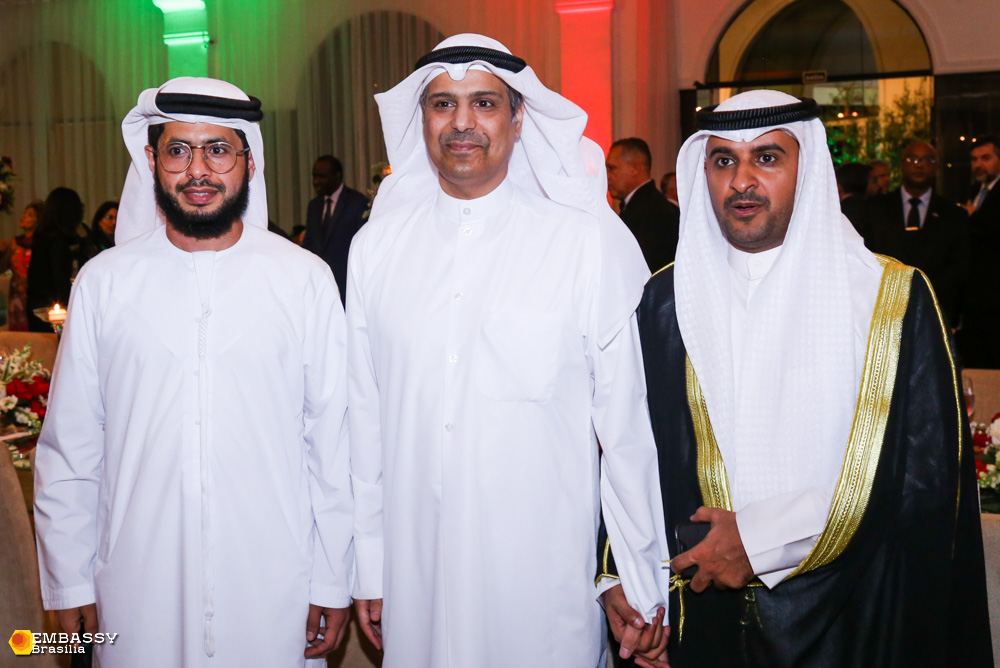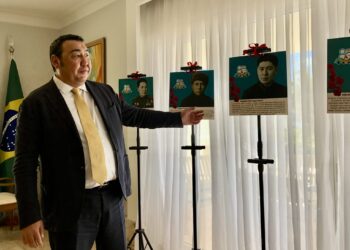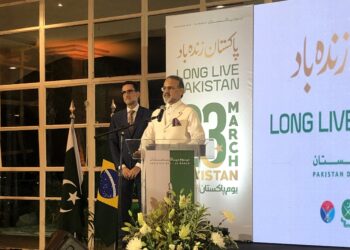Ambassador Nasser Al Motairi receives guests for National Date party. In a speech, he addresses topics such as the country’s potential and the relationship of that nation with the UN and Brazil
Raquel Pires / Liz Lôbo




Among those invited to the party were senators Fernando Collor and Izalci Lucas, the deputy governor of the Federal District, Paco Brito and Deputy First Lady Ana Paula Hoff, among other members of Brazilian and government diplomacy, and foreign ambassadors.
In his speech, the ambassador said that the country has been developing since its independence and that it has also been committed to creating bridges of cooperation with other nations. “We are leveraging our potential to provide grants, loans and assistance to other countries regardless of race or religion. The number of states benefiting from the Kuwaiti Fund for Arab Economic Development exceeded 100 countries, “he said.
The northwestern Gulf Arab country was founded just 57 years ago and borders Saudi Arabia to the south, Iraq to the north, and meets the sea to the east. Rich in oil, its oil reserves that represent about 10% of the world; with one of the largest per capita incomes in the world. It now has about four million inhabitants, one million Kuwaitis and three million foreigners, including Pakistanis, Indians, Filipinos, Bengalese and even Nepalese who come to the country in job search and a better life. They operate in the service sector, mainly in taxis, restaurants, coffee shops and hotels, and are the basis of the work pyramid. Kuwaitis work for the government, banks, oil companies, among other sectors with more professional qualification.

History – Kuwait was established as a small fishing village during the seventeenth century. At the end of the eighteenth century, its strategic position allowed it to thrive and become an important trading post and center of boatbuilding in the region. In 1756, the Al-Sabah family became ruler of Kuwait, initiating the dynasty that continues to this day.




Kuwait comemora soberania e política externa “equilibrada”
Embaixador Nasser Al Motairi recebe convidados para festa da Data Nacional. Em discurso, aborda temas como o potencial do país e a relação daquela nação com a ONU e o Brasil
Raquel Pires/ Liz Lôbo
Moderno e globalizado; além de ser um dos países que mais produzem petróleo no mundo, o Kuwait celebra na próxima segunda-feira (25) o 58º ano de independência e o 28º aniversário de libertação.

Em Brasília a comemoração foi antecipada para a última quinta-feira (21), no Dunia City Hall, no Lago Sul. A data marca o dia em que o xeque Abdullah Al-Salem Al-Sabah subiu ao trono em 1950. O embaixador Nasser Al Motairi enfatizou que o país tem adotado uma política externa equilibrada, respeitando os assuntos internos das demais nações, o que, a seu ver, “ficou claro, com a presença do Kuwait como membro não-permanente do Conselho de Segurança da ONU e os esforços para continuar com esse papel”.
Nasser Al Motairi agradeceu a cooperação entre Brasil e Kuwait, enalteceu o potencial brasileiro e reiterou que pretende continuar investindo nas relações entre os dois países. “Existe um desejo sério em promover a cooperação econômica e comercial e aumentar os investimentos kuwaitianos diretos no Brasil, e se beneficiar das experiências mútuas de ambos os países para alcançar resultados que satisfaçam as aspirações dos dois lados”.
Entre os convidados para a festa estavam os senadores Fernando Collor e Izalci Lucas, o vice-governador do Distrito Federal, Paco Brito e a vice primeira-dama, Ana Paula Hoff, entre outros membros da diplomacia brasileira e do governo, e embaixadores estrangeiros.

O país do noroeste do Golfo Árabe foi fundado há apenas 57 anos e faz fronteira com a Arábia Saudita ao sul, com o Iraque ao norte, e encontra o mar à leste. Rico em petróleo, suas reservas petrolíferas que representam cerca de 10% do mundo; tem uma das maiores rendas per capita do mundo. São atualmente cerca de quatro milhões de habitantes, sendo um milhão de kuwaitianos e três milhões de estrangeiros, entre paquistaneses, indianos, filipinos, bengaleses e até nepaleses que vêm ao país em busca de trabalho e de uma vida melhor. Eles atuam no setor de serviços, principalmente em táxis, restaurantes, cafeterias e hotéis, e são a base da pirâmide do trabalho. Já os kuwaitianos trabalham para o governo, bancos, empresas de petróleo, entre outros setores com maior qualificação profissional.
História – O Kuwait foi estabelecido como uma pequena vila de pescadores durante o século XVII. No final do século XVIII, sua posição estratégica permitiu que ele prosperasse e se tornasse um importante posto comercial e centro de construção de barcos na região. Em 1756, a família Al-Sabah tornou-se governante do Kuwait, iniciando a dinastia que continua até hoje.
Em 1899, em vez de enfrentar o domínio direto do Império Otomano, o xeque Mubarak ‘o Grande’ concordou que o Kuwait se tornaria um protetorado britânico, com a Grã-Bretanha fornecendo proteção naval em troca do Kuwait permitindo que a Grã-Bretanha controlasse seus assuntos estrangeiros. em 19 de junho de 1961, o Kuwait tornou-se independente com o fim do protetorado britânico e o xeque Abdullah Al-Salim Al-Sabah tornou-se um emir.




















